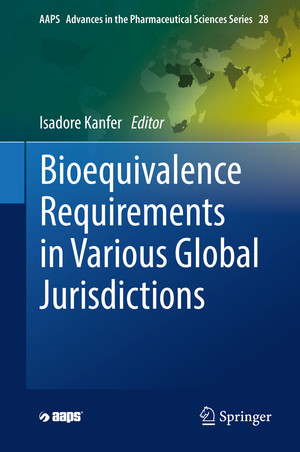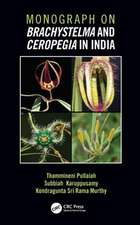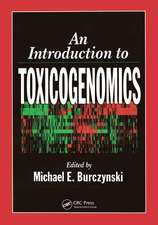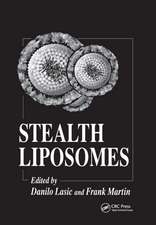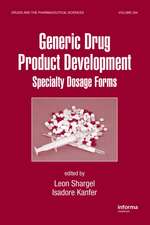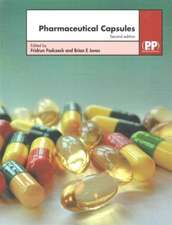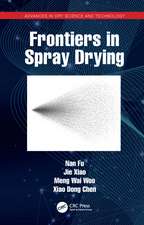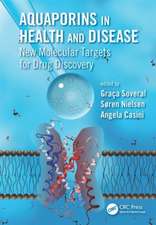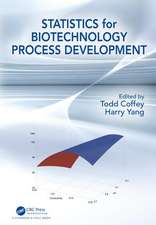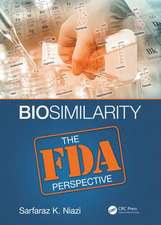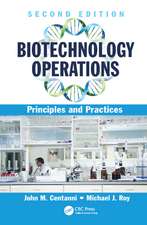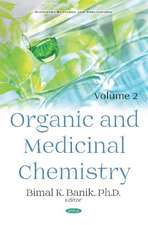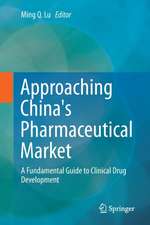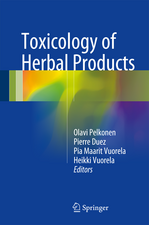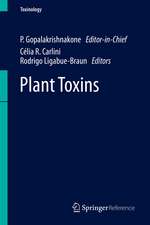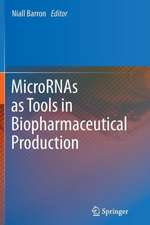Bioequivalence Requirements in Various Global Jurisdictions: AAPS Advances in the Pharmaceutical Sciences Series, cartea 28
Editat de Isadore Kanferen Limba Engleză Hardback – 21 dec 2017
USA and WHO will be of value to drug manufacturers, regulatory agencies, pharmaceutical scientists and related health organizations and governments around the world in the quest to harmonize regulatory requirements for the market approval of generic products.
| Toate formatele și edițiile | Preț | Express |
|---|---|---|
| Paperback (1) | 1141.60 lei 38-44 zile | |
| Springer International Publishing – 9 sep 2018 | 1141.60 lei 38-44 zile | |
| Hardback (1) | 1388.99 lei 43-57 zile | |
| Springer International Publishing – 21 dec 2017 | 1388.99 lei 43-57 zile |
Din seria AAPS Advances in the Pharmaceutical Sciences Series
- 5%
 Preț: 1054.35 lei
Preț: 1054.35 lei - 5%
 Preț: 1487.04 lei
Preț: 1487.04 lei - 18%
 Preț: 1132.98 lei
Preț: 1132.98 lei - 18%
 Preț: 952.86 lei
Preț: 952.86 lei - 18%
 Preț: 960.42 lei
Preț: 960.42 lei - 18%
 Preț: 1342.08 lei
Preț: 1342.08 lei - 18%
 Preț: 1563.24 lei
Preț: 1563.24 lei - 18%
 Preț: 1233.69 lei
Preț: 1233.69 lei - 18%
 Preț: 952.57 lei
Preț: 952.57 lei - 15%
 Preț: 639.37 lei
Preț: 639.37 lei - 5%
 Preț: 1630.22 lei
Preț: 1630.22 lei - 24%
 Preț: 791.50 lei
Preț: 791.50 lei - 5%
 Preț: 1426.71 lei
Preț: 1426.71 lei - 15%
 Preț: 646.25 lei
Preț: 646.25 lei - 18%
 Preț: 947.35 lei
Preț: 947.35 lei - 18%
 Preț: 1560.73 lei
Preț: 1560.73 lei - 18%
 Preț: 1573.36 lei
Preț: 1573.36 lei - 18%
 Preț: 1395.47 lei
Preț: 1395.47 lei - 18%
 Preț: 1002.61 lei
Preț: 1002.61 lei - 18%
 Preț: 1012.84 lei
Preț: 1012.84 lei - 18%
 Preț: 1235.43 lei
Preț: 1235.43 lei - 18%
 Preț: 1002.94 lei
Preț: 1002.94 lei - 18%
 Preț: 952.72 lei
Preț: 952.72 lei - 18%
 Preț: 1135.02 lei
Preț: 1135.02 lei - 18%
 Preț: 1409.21 lei
Preț: 1409.21 lei - 18%
 Preț: 995.17 lei
Preț: 995.17 lei - 18%
 Preț: 1019.35 lei
Preț: 1019.35 lei - 18%
 Preț: 1837.26 lei
Preț: 1837.26 lei - 15%
 Preț: 660.83 lei
Preț: 660.83 lei
Preț: 1388.99 lei
Preț vechi: 1693.89 lei
-18% Nou
Puncte Express: 2083
Preț estimativ în valută:
265.87€ • 288.89$ • 223.47£
265.87€ • 288.89$ • 223.47£
Carte tipărită la comandă
Livrare economică 21 aprilie-05 mai
Preluare comenzi: 021 569.72.76
Specificații
ISBN-13: 9783319680774
ISBN-10: 3319680773
Pagini: 344
Ilustrații: X, 345 p. 17 illus., 15 illus. in color.
Dimensiuni: 155 x 235 mm
Greutate: 0.67 kg
Ediția:1st ed. 2017
Editura: Springer International Publishing
Colecția Springer
Seria AAPS Advances in the Pharmaceutical Sciences Series
Locul publicării:Cham, Switzerland
ISBN-10: 3319680773
Pagini: 344
Ilustrații: X, 345 p. 17 illus., 15 illus. in color.
Dimensiuni: 155 x 235 mm
Greutate: 0.67 kg
Ediția:1st ed. 2017
Editura: Springer International Publishing
Colecția Springer
Seria AAPS Advances in the Pharmaceutical Sciences Series
Locul publicării:Cham, Switzerland
Cuprins
Brazil.- Canada.- China.- The European Union.- India.- Bioequivalence Studies in Japan.- Middle East and North Africa (MENA) Bioequivalence Requirements.- Russia.- South Africa.- The United States of America.- World Health Organization (WHO).
Notă biografică
Dr. Isadore Kanfer was appointed to the Chair as the first Professor of Pharmaceutics at Rhodes University in 1980 and served as Head of Pharmacy at Rhodes University and Dean of the Faculty from 1987-1989 and from 1999-2007. He established the Biopharmaceutics Research Institute (BRI) at Rhodes University and was its first Director. The BRI has successfully completed many bioequivalence studies on behalf of pharmaceutical companies. Professor Kanfer obtained his BSc (Pharmacy), BSc(Honours) and PhD in Pharmaceutics at Rhodes University and was Visiting Professor in Pharmaceutics at the University of California, San Francisco in 1980/81 and then in 1990 spent a year as Visiting Professor in the Division of Pharmaceutics at the University of North Carolina’s School of Pharmacy in Chapel Hill, in the USA. He subsequently spent several years in the Pharmaceutical Industry in Canada where he was Vice-President: Scientific Affairs. He is an Associate Editor of the Journal of Pharmacy & Pharmaceutical Sciences and a member of the Editorial Board of Encyclopedia of Pharmaceutical Science and Technology.
Dr. Kanfer has supervised 51 postgraduate students (MSc & PhD) and post-doctoral fellows in Pharmaceutical Sciences. He has contributed to over 200 research publications and conference presentations and is co-editor of 4 books in the series, Generic Drug Product Development.
He was the recipient of the Rhodes University Vice Chancellor’s Distinguished Senior Research award for 2007. He is a Fellow of the Pharmaceutical Society of South Africa (PSSA) and was elected as a Fellow of the American Association of Pharmaceutical Scientists (AAPS) in 2010 and in 2013 as Fellow of the Canadian Society for Pharmaceutical Sciences and has served as Chair of the AAPS Bioequivalence Focus Group. In 2008, he was appointed as Dean/Professor Emeritus (Pharmacy), Rhodes University and in 2010 as Honorary Professor, KLE University, Belgaum, Kar
nataka,India. He is currently a Professor at the Leslie Dan Faculty of Pharmacy, University of Toronto, Canada.
Dr. Kanfer has supervised 51 postgraduate students (MSc & PhD) and post-doctoral fellows in Pharmaceutical Sciences. He has contributed to over 200 research publications and conference presentations and is co-editor of 4 books in the series, Generic Drug Product Development.
He was the recipient of the Rhodes University Vice Chancellor’s Distinguished Senior Research award for 2007. He is a Fellow of the Pharmaceutical Society of South Africa (PSSA) and was elected as a Fellow of the American Association of Pharmaceutical Scientists (AAPS) in 2010 and in 2013 as Fellow of the Canadian Society for Pharmaceutical Sciences and has served as Chair of the AAPS Bioequivalence Focus Group. In 2008, he was appointed as Dean/Professor Emeritus (Pharmacy), Rhodes University and in 2010 as Honorary Professor, KLE University, Belgaum, Kar
nataka,India. He is currently a Professor at the Leslie Dan Faculty of Pharmacy, University of Toronto, Canada.
Textul de pe ultima copertă
Although the Bioequivalence (BE) requirements in many global jurisdictions have much in common, differences in certain approaches and requirements such as definitions and terms, choice of comparator (reference) product, acceptance criteria, fasted and fed studies, single and multi-dose studies, biowaivers and products not intended for absorption into the systemic circulation (locally acting medicines and dosage forms), amongst others, provide food for thought that standardisation should be a high priority objective in order to result in a harmonized international process for the market approval of products using BE. An important objective of Bioequivalence Requirements in Various Global Jurisdictions is to attempt to gather the various BE requirements used in different global jurisdictions to provide a single source of relevant information. This information from, Brazil, Canada, China, European Union, India, Japan, MENA, Russia South Africa, the USA and WHO will be of value todrug manufacturers, regulatory agencies, pharmaceutical scientists and related health organizations and governments around the world in the quest to harmonize regulatory requirements for the market approval of generic products.
Caracteristici
Combines BE (bioequivalence) standards from across the world into a single reference source Provides essential information for market approval of generic products Attempts to harmonize country specific standards Contributes to the cost-related benefits in the quest to make medicines more affordable and more accessible to the wider public around the world and, importantly, to ensure the necessary quality, safety and efficacy
